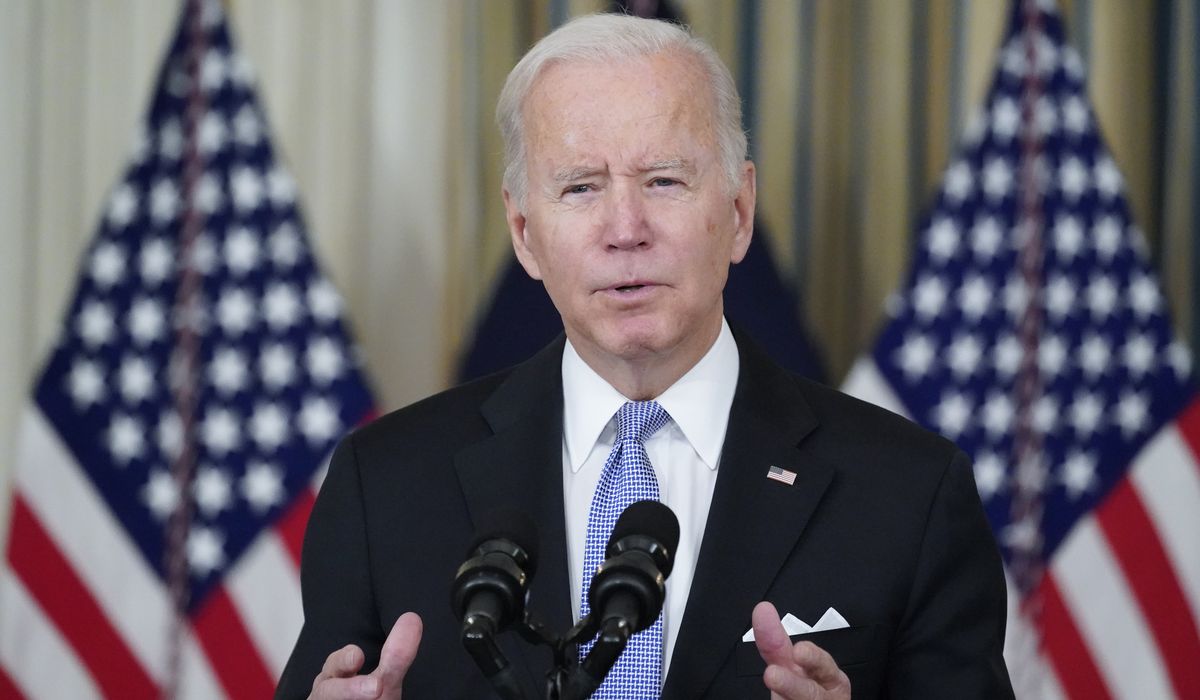
President Biden took a victory lap after the passage of the $1.2 trillion bipartisan infrastructure deal, calling it “a monumental step forward for the nation,” and then he set his sights on the next, bigger goal.
White House officials said the hard-fought and long-delayed legislative win gave Democrats momentum for the rest of Mr. Biden‘s ambitious agenda, namely a $1.75 trillion bill that would be a historic expansion of the welfare state. The big bill, however, remains deeply mired in intraparty fighting in Congress.
Mr. Biden’s team on Sunday said that with infrastructure out of the way, the pressure is mounting on congressional Democrats for a breakthrough on the $1.75 trillion social welfare and climate change bill. The package stalled in recent weeks, with both House and Senate Democrats crafting competing proposals without much consideration of the other.
“We are optimistic we’re going to get it done,” White House senior adviser Cedric Richmond told “Fox News Sunday.” “The president has an ambitious plan for the American people and the American economy and he’s going to invest in them.”
House Speaker Nancy Pelosi, California Democrat, pledged to hold a vote on the social welfare bill before Nov. 15. The timeline already suffered significant pushback from her party’s moderate faction, who have reservations about the bill.
Progressives say they are more determined than ever to score a win on Mr. Biden’s massive Build Back Better bill, which is the bulk of his legislative agenda. They note that the roads and bridges package would have failed if not for the crossover support of Republicans.
Mrs. Pelosi can only afford to lose three Democrats on any single vote. Six far-left lawmakers voted against the infrastructure bill, but those defections were offset by 13 House Republicans voting yes.
Future legislation, especially social and climate bill, Mr. Biden won’t have the GOP to bail him out.
“Either you are for the people who sent you to Congress or you are with the billionaires, corporate lobbyists and Big Pharma,” said Rep. Rashida Tlaib, a far-left Democrat from Michigan. “It’s time to choose.”
Moderate House Democrats like Rep. Josh Gottheimer say they will need an in-depth analysis of its cost from the Congressional Budget Office before they can support the legislation. Mr. Gottheimer and his allies prevented Mrs. Pelosi from holding a vote on the more than 2,000-page bill earlier this week because such data was unavailable.
Despite worries about the cost of the bill, Mrs. Pelosi has significantly expanded it, adding paid leave and an overhaul for Medicare prescription drug pricing — claiming the price tag is still only $1.75 trillion.
If the final bill includes another $100 billion to overhaul the immigration system, which Democrats want, the price tag rises to $1.85 trillion.
Mr. Gottheimer said he would be comfortable voting for the package provided the $1.75 trillion figure was accurate and the bill did not add to the deficit.
“We expect it all to match up with what was presented and we’ll move forward,” he said on CNN’s “State of the Union.”
The unwillingness of moderates to commit to the proposal outright underscores the ideological divisions and distrust among members of Mr. Biden’s party.
Given that Mr. Biden’s social welfare bill will pass using a party-line process known as budget reconciliation, which allows some spending measures to avert the Senate’s 60-vote filibuster threshold and pass via simple majority, the disunity could prove costly.
Democrats hold a 50-50 split in the Senate and only a three-seat majority in the House. The legislation needs to be acceptable to almost everyone, a feat proving nearly impossible given the ideological rift between moderate and progressive Democrats.
Complicating matters is that any reconciliation bill that moves past the House will be heavily altered by the Senate, where two moderate Democrats, Sens. Joe Manchin III of West Virginia and Kyrsten Sinema of Arizona, hold the balance of power.
“It will not be enacted as is. Everybody needs to sit with that and get comfortable with it,” said Sen. Brian Schatz, Hawaii Democrat.
Progressives fear that moderates will sink the bill. Mr. Manchin and Ms. Sinema already succeeded in cutting the size and scope of the measure.
The lawmakers forced Mr. Biden to trim the price tag of the spending bill from $3.5 trillion to $1.75 trillion. In the process, the White House dropped long-favored liberal priorities such as paid family leave.







